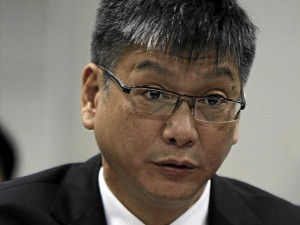Palace stands by cyber law
MANILA, Philippines—Malacañang on Friday admitted that it didn’t see the legal challenges against the cybercrime law coming, but was standing by its legality.
The Palace made this statement as human rights lawyer Harry Roque and columnist Ellen Tordesillas filed before the Supreme Court of the fifth petition against the controversial Republic Act No. 10175 or the Cybercrime Prevention Act of 2012.
Roque, Tordesillas, Vera files’ Ma. Gisela Ordenes-Cascolan, lawyer and blogger Romel Bagares, radio broadcaster Alexander Adonis and lawyer Gilbert Andres called on the Court to declare Sections 4 (c) [4], 5, 6, 7 and 19 unconstitutional.
Named respondents were Executive Secretary Paquito Ochoa Jr., Budget Secretary Florencio Abad, Justice Secretary Leila de Lima, Interior Secretary Manuel Roxas III, National Bureau of Investigation director Nonnatus Caesar Rojas, Philippine National Police chief Nicanor Bartolome and acting Director-General Denis Villorente of the Information and Communications Technology Office-Department of Science and Technology.
Undersecretary Abigail Valte said the Office of Executive Secretary Paquito Ochoa Jr. evaluated the controversial law affecting communication through cyberspace before it was signed into law by President Aquino on Sept. 12.
No objections
But none of the questions on certain provisions of the law, including one on libel, cropped up during the evaluation and earlier congressional deliberations, the deputy presidential spokesperson indicated.
“When it was being discussed in the Lower House, in the Senate, and on the level of bicam (bicameral conference), nobody was raising an objection,” Valte said when asked in a briefing if the executive branch saw the legal questions coming.
Sen. Teofisto Guingona III had petitioned the Supreme Court to nullify the law’s provisions that seek to impose a higher penalty on libel than those spelled out in the Revised Penal Code, opening the floodgates for the filing of similar cases.
Guingona charged that the law carried “confusing and vague provisions that suppresses the citizens’ right to freedom of speech and expression.”
Without a clear definition of the crime of libel and clear parameters on the persons liable, anybody could be charged with the crime, particularly those who retweet or comment on online updates or blog posts containing criticisms, the administration senator said.
Freedom not absolute
Valte, however, said that Malacañang was standing by the provisions of the cybercrime law, which was published Sept. 18 and takes effect on Oct. 3 based on the 15-day publication rule.
She said Malacañang welcomed the filing of more cases against the law.
Valte said freedom of expression is not absolute but comes with responsibility, and the same principle should apply on the Internet.
She said that the Revised Penal Code provides that anybody could be liable for libel, but the responsibility “has never stopped our press from being free.”
Valte called “a little paranoid” concerns that the government planned to institute a filtering structure that could be “potentially used for political and social censorship.”
Congress deliberation
She explained that in all pieces of legislation, it’s the Office of the Executive Secretary that prepares the evaluation and submits this to the President, who decides whether or not to sign it into law.
“Well, you have to remember that in the way a bill becomes enacted into law, it is not only the executive branch that is primarily responsible for this,” she said, referring to the review of the bill. She pointed out that Congress deliberates on it for months before transmitting it to the President for signing.
“I would imagine that given the normal legislative experience that we’ve had, we’re not talking of three months or four months only,” she added.
